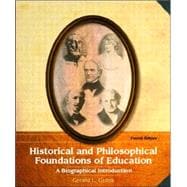
| Educational Biography and the Historical and Philosophical Foundations of Education | |
| Proponent of Educating for a Harmonious Society Confucius | |
| Idealist Philosopher and Educator for a Perfect Society Plato | |
| Founder of Realism | |
| Rhetorical Educator in Service of the Emperor Quintilian | |
| Scholastic Theologian and Creator of the Medieval Christian Synthesis | |
| Renaissance Humanist and Cosmopolitan Educator | |
| Theologian and Educator of the Protestant Reformation | |
| Pansophist Educator and Proponent of International Education | |
| Prophet of Naturalism | |
| Proponent of Educating the Heart and the Senses | |
| Advocate of Republican Education | |
| Proponent of Women's Rights and Education | |
| Leader of the Common School Movement | |
| Utopian Theorist and Communitarian Educator | |
| Founder of the Kindergarten | |
| Proponent of Liberalism | |
| Advocate of Individualism, Science, and Social Darwinism | |
| Advocate of Socialized Education | |
| Pragmatist Philosopher and Progressive Educator | |
| Proponent of Early Childhood Education | |
| Father of Indian Independence | |
| Scholar and Activist of African American Rights | |
| Advocate of Liberation Pedagogy | |
| Index | |
| Table of Contents provided by Publisher. All Rights Reserved. |
The New copy of this book will include any supplemental materials advertised. Please check the title of the book to determine if it should include any access cards, study guides, lab manuals, CDs, etc.
The Used, Rental and eBook copies of this book are not guaranteed to include any supplemental materials. Typically, only the book itself is included. This is true even if the title states it includes any access cards, study guides, lab manuals, CDs, etc.